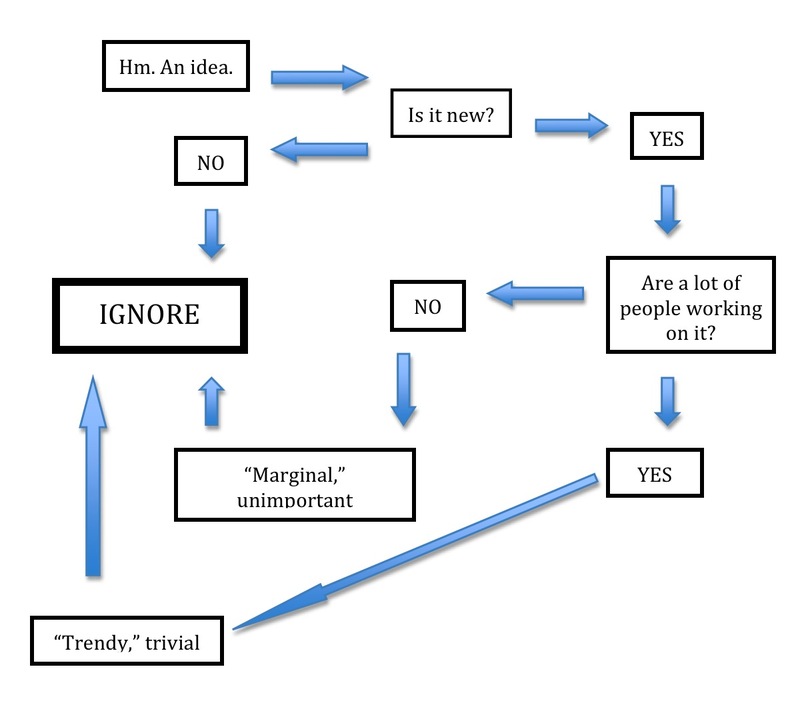Flowchart of the week
« previous post | next post »
From Phil Ford at Dial M for Musicology:
His analysis: "Sometimes I think that academics have a kind of mental operating procedure designed to insulate them from having to consider anyone else's ideas at all."
If you asked people to list the typical characteristics of academics, I doubt that they would often think of "conservative". But academics are among the most culturally conservative groups around, in my experience.
[I do know, of course, that political "conservatism" has little or nothing to do with conservatism in the sense of "tendency to preserve or keep intact or unchanged".
And statistically speaking, the right response to most new ideas is to consider them carefully and then reject them. But still… ]

Saqib Ali said,
July 15, 2008 @ 9:06 am
So more like a judicial conservative?
By judicial conservative, I mean a judge whose approach to constitutional and statutory interpretation involves fidelity to the text of the Constitution and adherence to the original understanding of that document or to the intent of the drafters. Ring, K. A. (2004). Scalia Dissents. Washington, DC, United States of America: Regnery Publishing, Inc.
Doctor Deaf said,
July 15, 2008 @ 9:43 am
"…fidelity to the text…adherence to the original understanding…or to the intent…"
That's not a judicial conservative, that's a judicial fundamentalist.
Faldone said,
July 15, 2008 @ 9:55 am
You left out a whole nother entry point:
Did one of my grad students come up with the idea?
No – Goto Hm. An idea.
Yes – Is it a good idea?
No – Goto IGNORE
Yes – Claim as own and publish
Bloix said,
July 15, 2008 @ 11:15 am
My own original ideas tend to fall into at least one of the following categories: (1) trivial, (2) well-known, (3) wrong.
Anonymous Stanford Grad Student said,
July 15, 2008 @ 3:31 pm
I'd say this chart doesn't even qualify as satire or exaggeration, because it EXACTLY describes how most Stanford faculty reacted to my research interests (in a department which I don't dare name).
Olga said,
July 15, 2008 @ 6:46 pm
It is so true it is depressing. I want to add:
[could it impact the field of study in a significant way]:
YES
[this is scary, can we close our eyes and hope it goes away?] > [ignore]
NO
[marginal, unimportant] > [ignore]
Nathan Myers said,
July 15, 2008 @ 8:33 pm
We might insert for scientific academics:
[does it involve mathematics I don't know?]
YES => [denounce as crackpot]
NO => (continue)
Aaron Davies said,
July 16, 2008 @ 1:15 am
Some physicist once remarked that science advances one funeral at a time….
ANP said,
July 18, 2008 @ 1:46 pm
http://www.youtube.com/watch?v=LGiU0FfCEQA
Xenobiologista said,
July 18, 2008 @ 10:34 pm
I'm lucky to have a PI who's willing to entertain slightly off-the-wall ideas. The downside of that is, everybody in the lab is working on a million and one projects. At least for the physical sciences where you have to buy costly equipment and reagents to make stuff (as opposed to sitting in an office reading books), part of conservatism seems to come from the fact that failure is quite literally expensive.
What's the excuse for humanities and arts people?
Spuffler said,
August 19, 2010 @ 10:16 pm
"Sometimes I think that academics have a kind of mental operating procedure designed to insulate them from having to consider anyone else's ideas at all."
–Yeah, that's called "focus', in their terms. To them, it makes no sense to waste time considering alternate explanations at a point in time where they are presently busy PROVING todays hypothesis… they can't take the time to assimilate a hundred contradicting details. WE have to trust THEM to make the proper decision at some point.